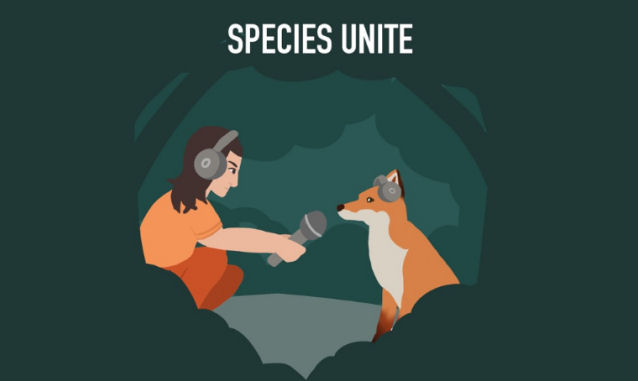based on my personal experience and having worked with scientists and researchers most of my life I would say that it s not too late There are some things that are probably gone There are places where only pockets of biodiversity may remain in the time ahead but that doesn t mean we can t still have a healthy future It may not be what it once was but it s like the old saying – when s the best day to quit smoking cigarettes Today – if you don t quit today when s the next best day Tomorrow So it s not too late We may have lost 50 of the world s coral reefs but that means there s 50 left We may have taken 90 of the big fish in the ocean but maybe there s 10 left We don t have to kill 100 million sharks every year We don t have to rollback legislation that determines how much carbon we pump into the atmosphere We can speak out against that and tell our elected leaders that we care The ocean doesn t have to turn acidic because we re dumping so much carbon into it that its chemistry is changing These are things that we can change and can control So I do remain cautiously optimistic I realize that the battle lines are drawn and we have to fight hard but I do think that it s worth fighting for It s not too late And we can see a reversal in the places that have been protected You do see that resilience The ocean does know how to take care of itself We just need to leave it alone -Brian Skerry Brian Skerry is one of the worlds most accomplished underwater and marine wildlife photographers and he is one of the greatest He s been a contract photographer for National Geographic Magazine since 1998 and his work has been featured in scores of other publications such as Sports Illustrated The New York Times BBC Wildlife Paris Match GEO The Washington Post The Wall Street Journal Smithsonian Esquire Audubon and Men s Journal He is also the author of 11 books including the acclaimed monographs Ocean Soul and Shark In his four decades exploring the world s oceans Brian has experienced things that very few humans will ever get to experience like diving with a population of southern right whales who had never before encountered human beings dropping down into their underwater universe Brian dives eight months of the year often in extreme conditions – beneath Arctic ice or in shark-infested waters His work brings us the beauty and the majesty of our oceans but it also shows us the devastation and the destruction that we ve caused them His stories raise awareness promote conservation and ultimately create change Today June 8th is World Oceans Day the day to celebrate the world s combined efforts to protect the one ocean that we all share And that ocean is in bad shape – between dead zones loss of apex predators rising sea levels affecting tidal ecosystems the bleaching of coral reefs oil spills polluting the waters and decimating habitats overfishing and hunting of marine species climate change rising acidity levels and plastic plastic and more plastic the ocean s future seems extremely bleak But as I learned from Brian there s still time Our ocean is resillient and there is so much left that we can save but we have to act now And I can t imagine a better day to begin than World Oceans Day So start by listening to Brian one of the best tellers of ocean stories out there Click here to visit this podcast episode

Listen to our podcast on podcasting success!


- The RIGHT Social Network For Your Podcast | S3 E17
- Does Your Podcast Have TOO Many Guests With Shari Post? S3 E16
- How Podcasters Can Succeed By Following Hulu's Strategy | S3 E15
- Guest Jodi Krangle Of The Audio Branding Podcast And The Podsafe Music Of Jess King | S3 E14 | Become A Successful Podcaster
- Podcast Guest Steve Guttman And The Podsafe Music Of Zaneta Z
- Podcaster Journey With Rapper And Podcaster Pryme Minister
- S3 E11: Dissecting Cast Magic's Output With Guest Greg Wasserman
- S3 E10 Successful Podcasters: Reena Friedman Watts Of The Better Call Daddy Podcast
- S3 E9 Why Podcasters Need Canva For Podcast Marketing
- S3 E8 How Does AI Define Podcasting And What Equipment Does AI Think You Need To Podcast?
- S3 E7 - Why Your Podcast Is Not Growing Fast Enough
- S3E6 - Podsafe Music 4th Of July With Shari
- S3 E5 - Does Your Podcast Need A Script?
- S3 E4 - Is SoundCloud Really A Good Platform For Podcasts? Should You Be On It?
- S3 E3 - How To Make Good Money Playing Podsafe Music On Your Podcast
- S3 E2 - Jay Fairbrother - Mastermind Groups For Podcasters Featuring The Music Of Lian Gold
- Why Are There So Many Podcasters Today? The Competition Out There And How To Survive. | S3 E1
- Meet Podcast Guest JoshPele Magic - Available Now As A Guest For All Podcasts | S2 E29
- Season 2 Bloopers, Funny Moments, & Inspiration Moments In 2022 With Co-Hosts And Guests
- What Are YOUR 2023 Goals For Your Podcast? Here Are Mine... | S2 E28
- The Reasons Your Podcast Needs A Holiday Episode | S2E27
- S2 E26 - Dave Jackson From The School Of Podcasting Tells What A Good Podcast Is
- S2E25 - Quora Marketing Basics For Your Podcast
- S2E24 - 7 Reasons Why There Are So Many Podcasters And How To Compete
- S2E23 - Secrets To Getting More Podcast Downloads
- S2E21 - 10 Ways To Make Your Podcast Episodes More Exciting For Your Audience
- S2E20 - Response To 2018 Episode On Podcast Network On School Of Podcasting
- S2 E19 I Listened To 1000 Podcast Episodes (Part 2) Here Is What The Most Successful Ones Do.
- S2 E18 - What Inspired YOU To Become A Podcaster?
- S2E17 - 7 Cool Ways To Make Your Audience Come Back Every Episode
- S2E16 - 3 Surprising Ways A Blog Will Grow Your Audience FAST!
- S2E15 - Simple 3-Part Marketing Strategy For Any Podcast
- S2E14 - Take Your Audience Along On The Date
- S2E13 Is Your Podcast More Successful With Seasons, Or NO Seasons?
- S2E12 - The Fastest Way To LAUNCH Your Podcast
- S2E11 - The FASTEST Way To Edit Your Podcast
- S2E10 -How To Get High Google Rankings For Your Podcast
- S2E9 - Would Elon Musk Invest In YOUR Podcast?
- S2E8 - The Most Sought Out Podcast Categories Summer 2022
- S2E7 - How To Improve Your Podcast By Listening To Others
- S2E5 - Fresh Music Series With Hugh Macdonald & Holland Nelson And Melo Mafioso
- S2E4 - Fastest Way To Make Money Summer 2022
- S2 E3 - Monthly Podsafe Music Show For Your Podcast - 5 Songs From Singer/Songwriter Doug Cash
- S2 E2 - Monthly Podsafe Music Show With Doug Cash, Winchester 7, And Bruce Chamoff
- S2E1 - Monthly Music Show With Winchester 7 And The Runners
- EP51 - The Right Way To List Your Podcast Guests
- EP50 - Running Out Of Episode Ideas? How To Brainstorm Fast!
- EP49 - How To Become An Influencer Through Your Podcast
- EP48 - Vik Rajan Of PhoneBlogger.net And Https://videosocials.net/
- E47: Rob Intellisano Of The Amazon Hit Gravesend
- EP46 - How To Build A Podcast Community With Adrian Miller
- EP45 - Easy & Fun Podcast Editing Tips W/Professional Podcast Editor Merrill Loechner
- EP44 - Marketing Your Show On LinkedIn With Marc Halpert
- EP43 - Benefits Of A Podcast Network With Guest Rich Butler
- E42 - What Makes You Successful With Guest Tim B
- EP41 - The Best Instagram Hashtags For Podcasts
- E40 - More Benefits Of Podcasters Blogging W/ The Delaware Blogger Guest Antionette Blake
- EP39 - Why Podcasters Need A Mobile App With Guest John Lee
- E38 What Makes YOUR Podcast Successful With Guest Frank Sasso
- E37 - Facebook/Instagram Down? What Affected Podcasters Can Do.
- E36 - How To Make Single-Host Podcasts Work
- E34 Q&A With Professor Pete Alexander: My Audience Has Dropped! Now What?
- E33: Upcoming Episodes For September And October 2021
- E32 Blogging For Podcasters - The Process
- E31 Why Blogs Make Your Podcast MORE Successful
- E30 The POWER Of Your Podcast's RSS Feed (Video)
- E29 - Subscribe To Your Podcast Competition?
- E28 PodcasterLinks.com And MediaGirlNetwork.com
- E27 Successfully Podcasting With Your Smart Phone
- Daily Podcast Success Update For 9/2/2021
- E26 Best Time To Monetize Your Podcast
- E25 Can You Podcast From The Airport? From Las Vegas...
- E24 Treat Your Podcast Like A Lobster Roll
- E22 Do Guests Really Enhance Your Show?
- Daily Success Update:Education Podcasts Wed, Aug 11, 2021
- E21 Connecting With Your Podcast Audience To Grow Faster
- Daily Success Briefing Fri, Aug 8, 2021
- E20 Search Engine Optimization Strategies For Your Podcast
- E19 Podcasting During The Delta Variant Of Covid19
- E17 How To Beat The Competition On Apple Podcasts
- E16 Rapid Podcast Editing & Avoiding Pod Fade
- E14 Dual Podcast With Guest Podcaster Antionette Blake Part 2
- E13 Dual Podcast With Guest Podcaster Antionette Blake Part 1
- E12 How To Get More Engagement For Your Podcast Episodes With Guest Interviews
- E11 My Special Guests: Jeff And Jim Wood Of SwimAble
- E10 Surprise Visit To Philadelphia And Atlantic City
- E9: Special Guest Dominique Carson Journalist & Certified Massage Therapist
- E8: 8 Fun Audacity Effects For Podcasters
- PodKnow 2021 Online Podcasting Event With Conference Speaker: Merrill Loechner
- E5: I Listened To Over 1,000 Podcast Episodes And Here Is What I Found The Best Ones Do.
- E4 - Buzzsprout Was Down On Sunday, Feb 21, 2021. What That Means For YOUR Podcast. My Reaction...
- E3: Five Things To Do Right Now To Grow Your Podcast Audience Fast.
- E2 - Should Podcasts Have Beautifully Produced Introductions With Voiceover And Background Music (and What Your Audience Thinks Of It)
- E1 - Become A Successful Podcaster - Keep Listeners On Your Podcast Episodes Longer
- Become A Successful Podcaster With Bruce Chamoff - Audience Growth, Monetization, Marketing & More! (Trailer)

